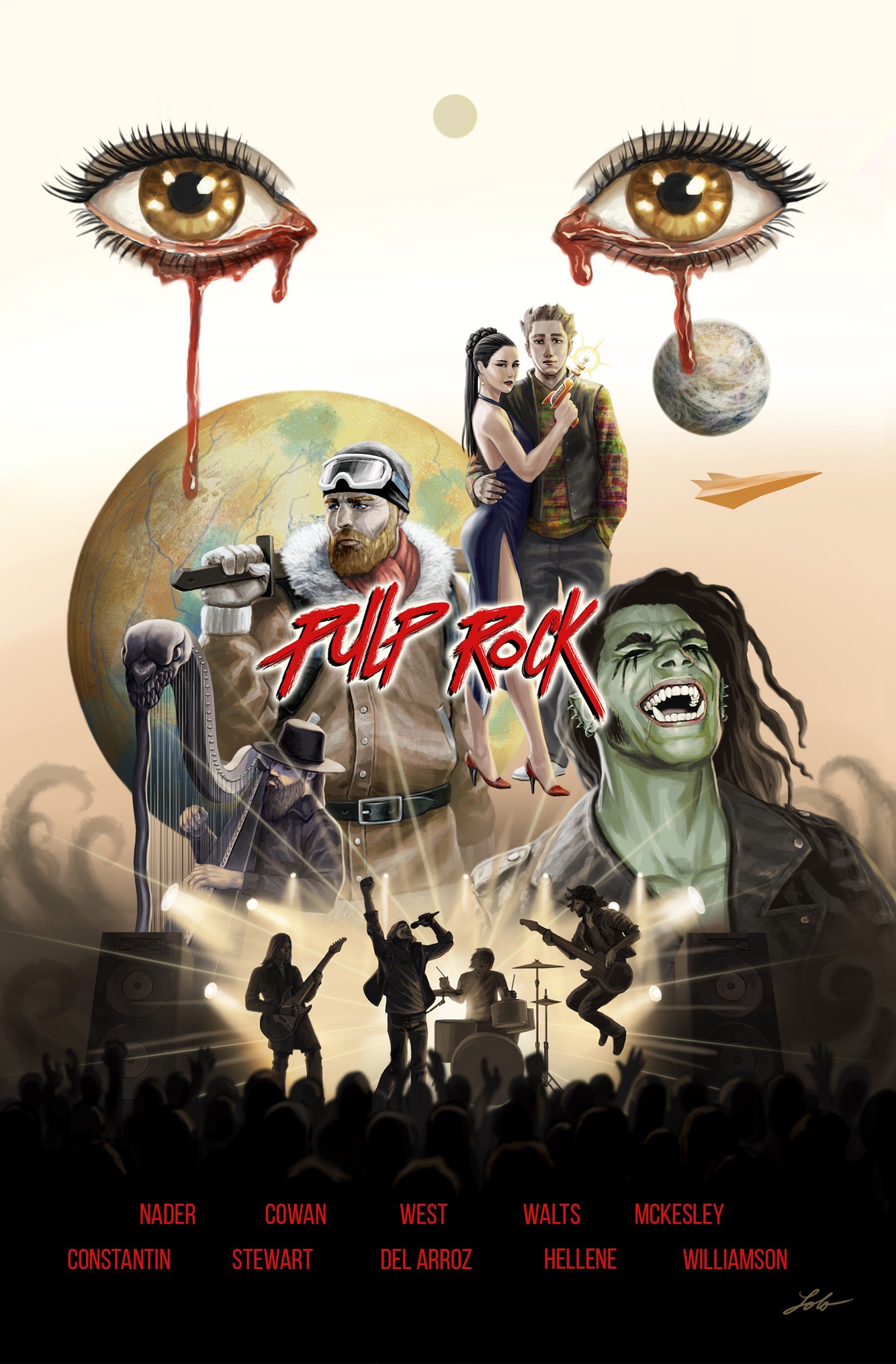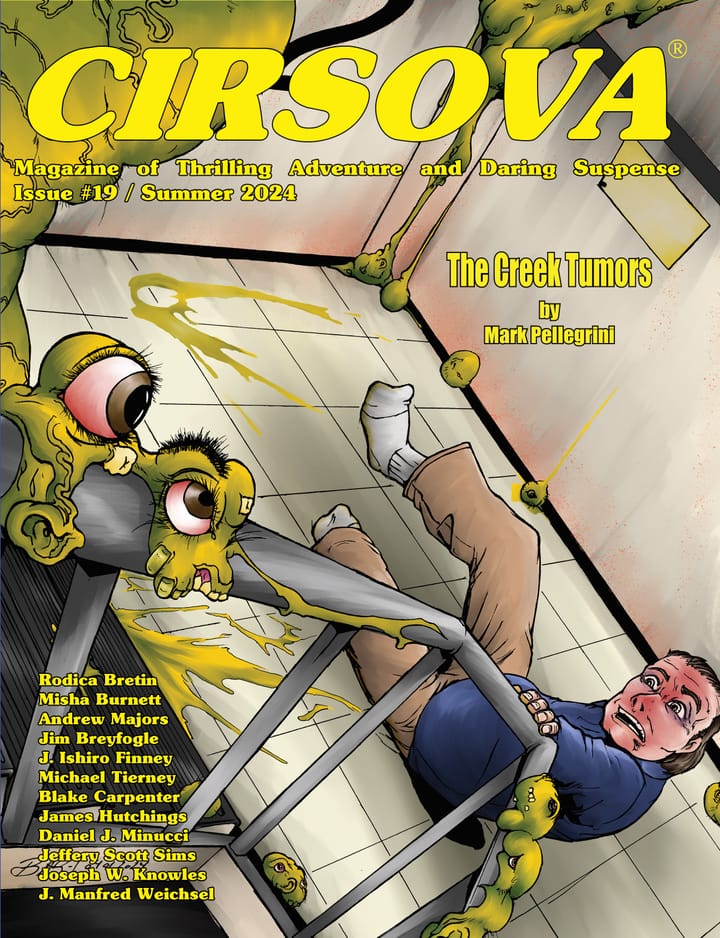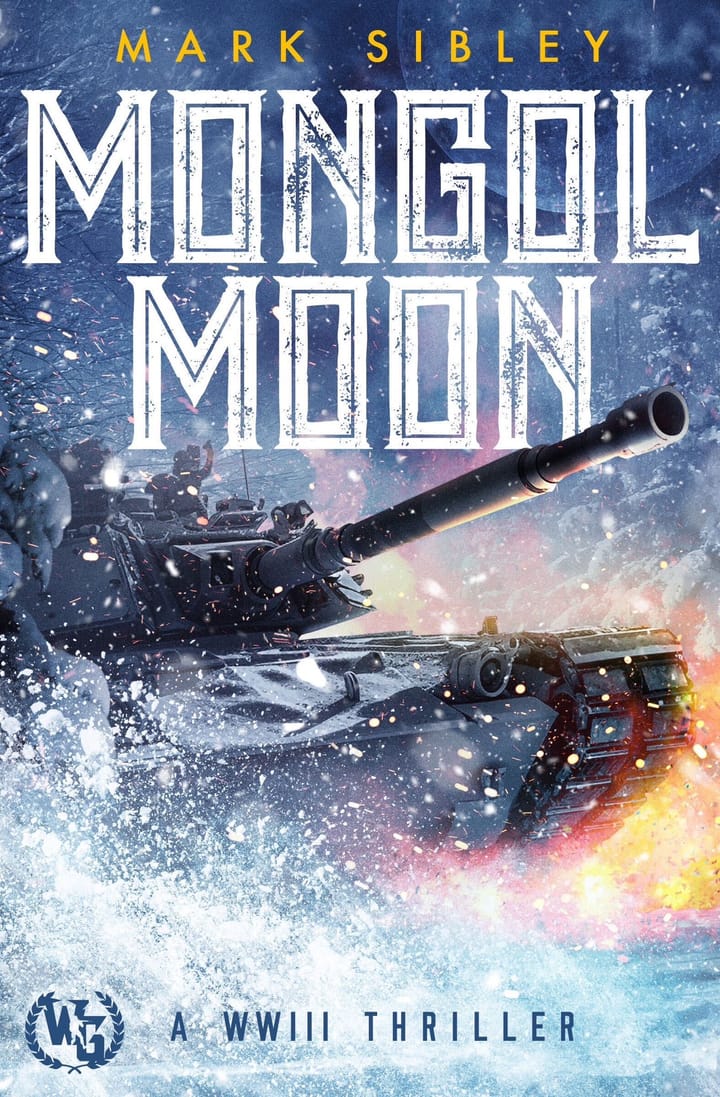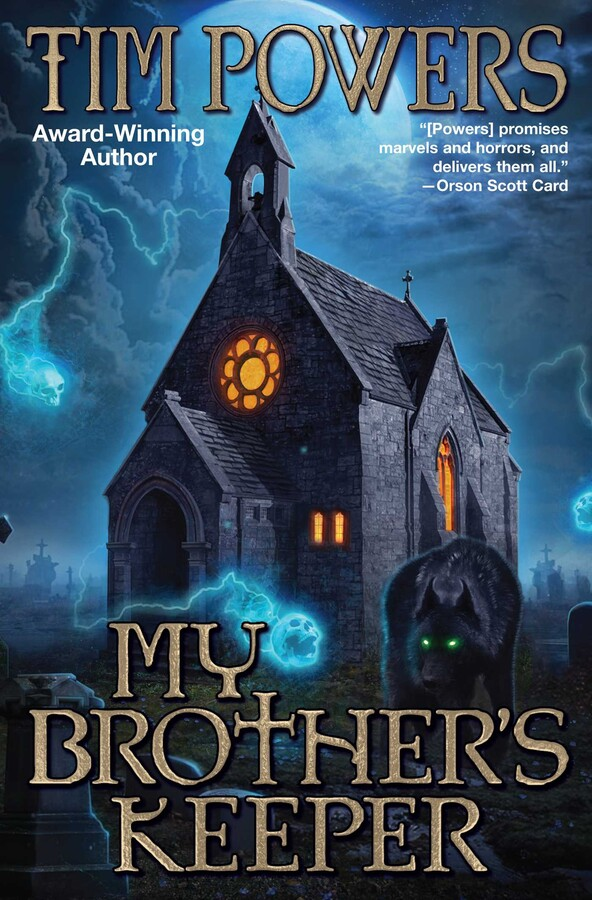Pulp Rock Book Review

Pulp Rock February 21st, 2022
Edited by Alexander Hellene, cover art by Manuel Guzman, formatting by Kevin G. Summers
When I got a request from Alexander Hellene to review this volume of musically inspired short stories, I had to laugh, because I am one of the least musical people I know. I can lose the beat of a song I am listening to. I’m sure I missed a couple of dozen really awesome musical references. However, I was pleased to agree to provide a review, as I have read works by several of the authors contributing to Pulp Rock [Amazon link], and I had a reasonable expectation of enjoying it.
I wasn’t disappointed. Pulp Rock offers stories that range from adventure to tragedy to absolute weirdness. If you are curious about its origins, the Kickstarter page offers Hellene’s thoughts on the impetus for this volume. As is my usual plan with short story anthologies, I will offer some brief thoughts on each story within the collection, and an overall summary. For my rating scale, I looked back at my review of Timothy Zahn’s Cascade Point and Other Stories. These aren’t Amazon stars for marketing, these are my best judgement of overall skill against a master.
Altered Egos by Patrick Walts ****
The primacy of the rock star in the popular culture of the last half of the twentieth century is an absolutely remarkable phenomenon. The ready availability of contraception made possible the mass adoption of loose sexual morals that fueled the rock stars’ notorious behavior, but at the same time it probably denied them the kind of outsized reproductive legacy you can see in population genetics for other men with ready access to huge numbers of willing women.
That aside, this is a absolute blast of a story, blending together multiple accounts of the same series of events, the pandemic experience, and some utter weirdness in such a way that you are left wondering what is real? Everytime another aging rocker tells his story, you are sure it must be the real truth. An absolute trip, and a blast as well.
Mad Wind by JD Cowan ****
Music can be used as a kind of social technology, a way of creating or reinforcing emotions. Plato’s Republic notoriously was anti-art, seeking to control this potent source of social leverage by ensuring a monopoly on it, as the modern state claims a monopoly on the use of force.
JD Cowan’s “Mad Wind” is about those who freelance their contribution to the greater good, and about a world that is far weirder than its residents know. Cowan excels at compact scene setting like this.
Other books by JD Cowan
Gemini Man series
Gemini Warrior: Gemini Man Book 1
Doom Chord by Ryan Williamson **
Ryan Williamson’s half-orc bard gets a pretty big chunk of real estate on the cover of the book. This story gives off a pretty strong D&D vibe, so maybe Williamson has been playing at lot of RPGs lately. I’m not much into the heavy metal scene, so this may not be the story for me. Fun vibe though.
This is the first story in the collection to use a Faustian deal with the devil as a theme. Oswald Spengler described Western civilization as Faustian:
According to Spengler, the West is a "Faustian" civilization. Readers will recall that Faust was a legendary Renaissance scholar-magician who sold his soul to the devil in return for knowledge and power. To be Faustian is to be impatient of limits, to seek the hidden, to take terrible risks.
The broader theme is about the pursuit of knowledge and power, and music and other art comes in as subset of that. Goethe’s Faust is from 1808, but I suspect the idea of great gifts of artistic expression coming from preternatural sources is an old old one, though I don’t have a ready reference to mind. Something I had actually missed until just recently is that Faust escapes his deal with Mephistopheles in part, allowing him salvation. That puts a rather different spin on what I take Faustian to mean.
Other books by Ryan Williamson
The Ravenous Dead [reviewed as The Widow’s Son]
Keep it Burning Bright by Alexander Hellene ****
I have said that tragedies aren’t something you see a lot in pulp stories, and I think that is more true with novel length and less true with short stories, as this one illustrates. The short story form allows authors to stretch a bit more. I don’t think I would want a novel length version of this story, it would drag you down too much. But as a short story, it has a visceral punch to it that is just right. Adventure, myth, and legend blend together in this tale of grief, loss of purpose, and betrayal.
The Devil’s Harp by David J. West ****
A weird western, featuring Samuel Clemens and set in Salt Lake City. This is the second story in this collection about how musical gifts are often gained via a deal with the devil. Straight up adventure, which is after all where the western shines. I do really like the weird western as a style though, as the unfiltered and untamed nature of the American West allows it to host some pretty eerie things without manipulation.
Farewell to Once and Future Kings by David V. Stewart ***
Any synoptic history of art in the twentieth century will have to grapple with the fact that popular art was not entirely an organic phenomenon, the work of fashion or the market. It was also the product of policy both public and secret. Here we get a spy story in a musical setting that gives a nod to this not especially secret history.
The Crying Girl by Alexander Nader ***
A trippy first-person druggie story. Not really my thing, but I enjoyed this story enough to go look for other stuff Nader has written.
Entomochronicity by Alexandru Constantin ***
I’m not sure that I grasp all the symbolism of this very strange story about the unusual powers of a very unusual song, but it was a very striking depiction of the life arc of a veteran of the Forever Wars in the Middle East. I find it pretty sad that there is a standard life arc that goes from getting out to alcoholism to unfulfilling job and marriage to divorce and sometimes worse.
Master of Puppets by Jon del Arroz ***
A horror story, which in the best horror tradition, is about the consequences of crossing a line that should not be crossed. Gives me vibes of the 80s/90s horror movies of a similar name. I have to assume that the title is a reference to the Metallica album. See, I got one.
Princess of the Night by Paul McKesley ***
The Space Opera/Mecha entry in the collection. Some short stories are best if never followed up on, as expansion dulls their power, but I would actually be interested in more in this particular universe. Mecha needs more good examples.
A Song for Melienope by Alexandru Constantin ****
A fairy tale/horror story, which is after all where horror really comes from. Fairy tales are all about reinforcing morality, showing you the consequences of sin in an immediate manner. Good horror pulls on the mythic resonance that fairy tales evoke, and myths are after all the stories we tell ourselves that are so good they can last forever. Modern fantasy is lost without this link, which is what gives this kind of story its power.
Kentucky Mothers by Alexander Hellene ***
The third instance of a musician making a deal with the devil, giving you an idea of the kind of mental real estate this concept occupies. The most overtly relevant of the stories in the collection, it is a clear reference to the fate of Dennis Hastert. A great conspiracy story.
Ben’s Verdict ****
An absolutely solid collection. I’m really impressed with a lot of the stories in this volume. I can see why Alexander Hellene reached out to me, even though I am not much of a musician or a music fan, these stories still touch on timeless themes that I know something about. I think anyone who is a fan of pulp fiction could find something to like here, and maybe an author worth following up on.
Pulp Rock comes out on Amazon on February 21st, 2022.
I received a copy of this book from the editor.



Comments ()